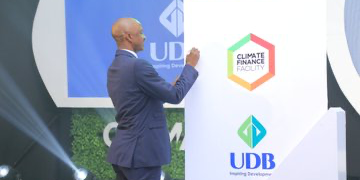Uganda Development Bank (UDB) on Wednesday 6, launched the UDB Climate Finance Facility (CFF), a strategic Fund that will make available affordable finance that aims to promote climate-smart agriculture and ensure climate-resilient infrastructure and low-carbon industries.
Addressing guests at the launch in Kampala, the Ministry of Finance Permanent Secretary, Ramathan Ggoobi, said providing targeted financing for climate adaptation and mitigation is very critical to significantly reduce the impact of climate change in our country.
“This could include development of climate resilient practices, especially in agriculture, mining and many other extractives which are the bedrock of our economy but also promoting renewable energy development,” Ggoobi said.
He added that the climate change impact has been seen through the severe drought that hit the country last year and created a food crisis.
The Managing Director of UDB, Ms Patricia Ojangole, said the increasing threat of climate change and environmental degradation has the potential to present high socio-economic risks to the economy.
She noted that as the impacts of climate change continue to manifest through floods, drought, landslides, and animal and crop epidemics among other signs in different parts of the country, they are more deleterious to the poor and marginalized who depend largely on natural resources for their livelihoods.
Over 70% of Ugandans depend heavily on micro, small, and medium enterprises (MSMEs) for employment, and these generally have less capacity to withstand financial shocks.
“The vulnerability of Uganda’s population requires the urgent need to adapt and maintain future economic growth opportunities by transitioning to a low carbon (green) economy. This will require massive investment in green technologies. Green finance will be central to providing the flows of capital required. This is primarily driven by the fact that most green technologies are characterized by high capital intensity and consequently high upfront financing requirements,” Ms Ojangole explained while at the high-level launch held at Mestil Hotel In Kampala.
As a financial intermediary, the Bank will stimulate green economic growth by coordinating green financing options, mobilizing and increasing access to green finance by structuring and providing tailored products to address market gaps including risk mitigation products, and providing the right products to address investment demand in the green sector.
The initiative will foster climate-conscious change in investments with a clear objective of building climate resilience among the businesses supported.
The intention is to build climate-proof businesses as this is a better strategy for building long-term viable enterprises that are adaptive to climate impacts and seek a low-carbon development pathway.
The move to create a Climate Finance Facility builds on the Bank’s successful initiatives to foster innovation, engender holistic sustainability, and increase interest in green technologies.
In line with the Bank’s priority sectors, the facility shall target investments in Climate Smart Agriculture, Low Carbon Industries, Climate Resilient Infrastructure, and cross-cutting projects like sustainable waste management, clean energy – renewable energy and energy efficient projects, sustainable water resources management, eco-tourism, and related investments.
“There have been commendable efforts by the Government in establishing structures and policies to advance climate action. Progress is ongoing in scaling up local community solutions to manage climate impacts. However, it is now time for financial institutions and private sector players to get involved. That’s why we are committing UGX 50 billion towards the capitalization of this facility. This is expected to grow with support from various partners over time,” Ms Ojangole concluded.
The beneficiaries will also be exposed to the Bank’s Green Investment Advisory as well as the Project Preparation Support to make them bankable but more importantly, grow them to become viable green businesses.









